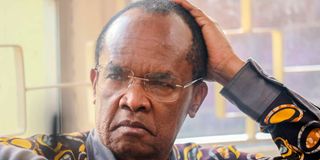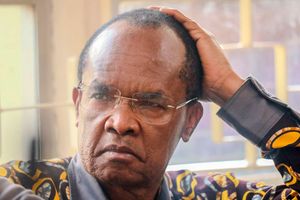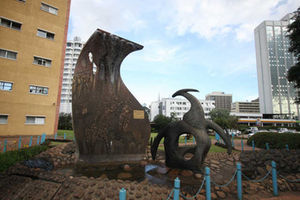
Former University of Nairobi Council Chairman Prof Amukowa Anangwe at the Milimani Law Courts in Nairobi on May 16, 2025.
Finally, Prof Amukowa Anangwe, the controversial chair of the University of Nairobi Council, resigned after a protracted period of combat with the management and national government. It’s good riddance and a chance for restoration for the university.
Prof Anangwe had the qualifications but he was the wrong choice for the job. Intemperate and intimidating, Prof Anangwe defied the rule book and fought everyone around him as he made unilateral and costly decisions that will haunt the university for long. His tenure was marked by relentless conflicts, repeatedly clashing with vice-chancellors and ministry officials, causing tension at every turn.
However, the forced exit of the embattled chair is not the end of the university’s tribulations. But it offers a chance for reflection and a search for a new bearing. Prof Anangwe’s presence at the university was a manifestation of the rot in Kenya’s university’s system arising from poor leadership.
The institutions are bedevilled with numerous challenges ranging from poor governance to outright theft and looting of resources. The consequence is poor quality teaching and learning.
Part of the problem is the legislation. The Universities Act gives powers to the President to appoint the chancellor of public universities while the Education Cabinet Secretary is mandated to appoint council chairperson and members. These provisions provide the genesis of poor governance in public universities.
In principle, the law envisaged that the appointing authorities would make judicious decisions in selecting chancellors and chairpersons. However, in practice, these offices have been turned into tools for rewarding political supporters and friends. The process is opaque and appointments are made indiscriminately without evaluation of the capabilities of the individuals. Politics dominates, while professional considerations have been cast aside.
Correspondingly, the universities are burdened with individuals who do not offer any strategic leadership but serve the interest of their benefactors.
In the circumstances, we have domineering and grandstanding individuals whose daily duty is to intimidate academicians as force through bizarre policies and decisions. They interfere in administrative matters, disrupting institutional operations with impunity, confident that they are protected from any sanctions.
From experiences elsewhere, the top university leaders are appointed through a competitive process and involve the participation of the staff and students. Chancellorship and council membership are positions of honour. Ideally, they are a reserve of exemplary professionals who have excelled in their areas of expertise and demonstrated unparalleled leadership skills.
Their role is to advise, which presupposes advanced scholarship and knowledge in leadership, finance, human resources and resource mobilisation.
However, in our case, we have lowered the bar, and because of political influence, stuffed university councils and chancellorship with some mediocres and busybodies ruining the institutions.
Education Cabinet Secretary Julius Ogamba must change the trajectory. He has to define clear criteria for selecting qualified and suitable individuals to sit in the universities’ top decision-making organs.
The starting point is to advertise the positions and let independent institutions such as the Public Service Commission (PSC) conduct interviews and identify qualified and suitable individuals for appointments. Better still, use the services of executive search teams to identify appropriate candidates. In turn, the councils should operate independently and importantly, deliver targets.
Beyond that, the universities must reclaim their autonomy. Vice-chancellors and councils have long ceded their authority to the political establishment. Moreover, the roles and functions of university councils and management have become blurred.
Many VCs do not make decisions on their own but instead await directions from elsewhere, yet universities are intellectual hubs. They train and graduate top leaders, thus, it is paradoxical that they persistently suffer from poor leadership. Ideally, they should offer luminary leadership.
Exceptional university leadership extends beyond overseeing academic programmes to encompass successful research initiatives, innovation, and effective fundraising. Unfortunately, this aspect is notably underdeveloped in our setting.
Locally, the public universities have traditionally relied on government appropriations for capitation funding; however, diminishing remittances have left them facing significant budgetary shortfalls. What obtains here is not sustainable.
Revitalising university leadership should go hand in hand with the overall transformation of higher education. The universities require thorough makeover guided by appropriate legislation. It is instructive that enrollments are shrinking as potential students seek other alternatives because they do not have confidence in the universities.
Statistics from the Kenya Universities and Colleges Central Placement Service (KUCCPS) show that many students who qualify for university education prefer to enroll for technical and vocational education and training where they see a greater future. The tertiary institutions offer practical skills that adequately prepare students for employment. This trend should worry the universities.
In recent years, the government has talked so much about remodelling university education to align with the emerging global trends. Unfortunately, the measures taken are fragmented and poorly planned, leading to a disastrous outcome.
The controversial new university funding model – variable scholarship and loan funding – stands out as a sore thumb. It is an epitome of misadventure and demonstrates the folly of poor planning and implementation.
The University of Nairobi and the others have been presented with an opportunity for renewal. Prof Anangwe’s leadership is a lesson on how not to run an institution. It is also a lesson to the government on the folly of whimsical appointments of university leaders.
Overall, structural, administrative and legal reforms are imperative to restore sanity to the university. The same applies to the other public universities suffering poor leadership and strutting from one crisis to another.
David Aduda is a Consulting Editor and Education Specialist. [email protected]






